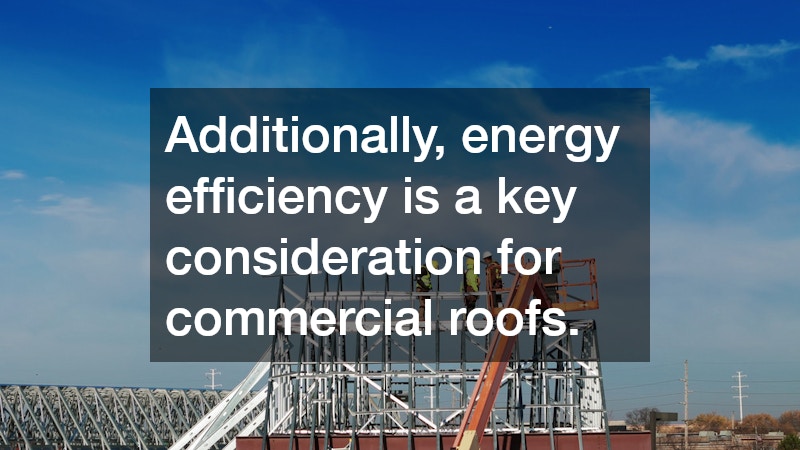Commercial roofing is a field that demands precision and expertise. Unlike residential roofing, which often uses materials like asphalt shingles, commercial roofing solutions typically require more durable materials such as TPO, EPDM, or metal roofing systems. These materials are built to withstand various environmental challenges and last for several years, even under heavy usage and adverse weather conditions.
A fundamental aspect of understanding commercial roofing is recognizing the importance of roof inspections. Regular inspections allow experts to identify potential issues before they escalate into major problems.
This proactive approach can save business owners significant money in repairs and property damage by addressing concerns early.
Additionally, energy efficiency is a key consideration for commercial roofs. Many businesses turn to reflective roofing systems that deflect sunlight, thereby reducing cooling costs during the hot months. Incorporating insulation and other energy-saving options can significantly enhance the building’s overall efficiency and reduce environmental impact.
Choosing the Right Commercial Roofing Material
The selection of the right material for your commercial roof is crucial to its longevity and performance. TPO (Thermoplastic Olefin) is a popular choice due to its reflective properties and ability to resist UV rays, which can help reduce cooling costs. Alternatively, EPDM (Ethylene Propylene Diene Monomer) is favored for its durability and long lifespan, especially in regions with harsh weather conditions.
Metal roofs are another viable option, particularly for those seeking both durability and aesthetics. This type of roofing is resilient to fire, wind, and impact, making it suitable for areas experiencing extreme weather conditions. Additionally, metal roofs can be customized with coatings that not only protect them but also improve their ability to reflect heat from the sun.
Each material comes with its unique set of advantages and potential downsides. Consulting with a local commercial roofing expert can help businesses make informed decisions based on their specific needs, budget, and local environmental conditions. Additionally, expert advice can guide you through the installation process, ensuring compliance with local building codes and safety regulations.
Maintaining Your Commercial Roof: Best Practices
Maintenance plays a pivotal role in maximizing the lifespan of a commercial roof. Regular maintenance includes cleaning debris, checking for damage, and ensuring that drainage systems function correctly. These actions can prevent minor problems from becoming costly repairs and help sustain the roof’s structural integrity.
Aside from routine inspections, business owners should maintain updated records of their roof’s history, including past repairs and services. This documentation can be vital when working with insurance companies or when preparing for future upgrades. Records keep everyone informed of the roof’s condition and facilitate better decision-making regarding any necessary interventions.
Roof maintenance should also adapt to seasonal changes. For instance, before winter, ensure your roof is in good condition to handle snow loads, while pre-summer checks focus on optimizing heat reflectivity and ensuring that cooling systems are operable. A proactive maintenance strategy reduces unexpected costs and enhances the roof’s performance year-round.
Commercial Roofing Installation: What to Expect
Installing a commercial roof is a complex process that involves detailed planning and precise execution. The process begins with a comprehensive assessment of the building, taking into account factors such as the roof’s size, design, and any unique architectural elements. This initial assessment helps in tailoring a roofing solution that meets all the functional and aesthetic requirements of the building.
During the installation phase, skilled professionals adhere to specific procedures to ensure quality and safety. This includes using advanced equipment and techniques, as well as following all local building codes and industry standards. Proper installation is not only crucial for the roof’s immediate performance but also for its long-term durability and return on investment.
Once the installation is complete, a final inspection verifies that all aspects of the roofing system meet the required benchmarks. This concluding step ensures both building owners and contractors are satisfied with the result, setting a high standard for roofing quality. Subsequently, providing businesses with a roof that is reliable, efficient, and built to last.
Why Choose a Local Expert for Your Commercial Roofing Needs
Employing a local commercial roofing expert offers several distinct advantages. Local professionals have an acute awareness of regional weather patterns, building codes, and material performance in the specific climate, ensuring that your roofing solution is tailor-made for its environment. Their expertise can be invaluable when addressing climate-induced challenges, such as heavy rainfall or extreme temperatures.
Additionally, local roofing experts can provide faster response times, which is crucial in emergencies. A local provider can typically offer immediate assistance, preventing further damage while ensuring that business operations can continue unhindered. Their proximity and long-standing presence in the community often mean they have established reputations based on reliability and quality service.
Partnering with a local expert also strengthens community ties and supports the local economy. These experts are often more accessible for ongoing maintenance, which is essential for the roof’s long-term health. Establishing a relationship with a trusted local provider adds another layer of security and peace of mind for business owners.



